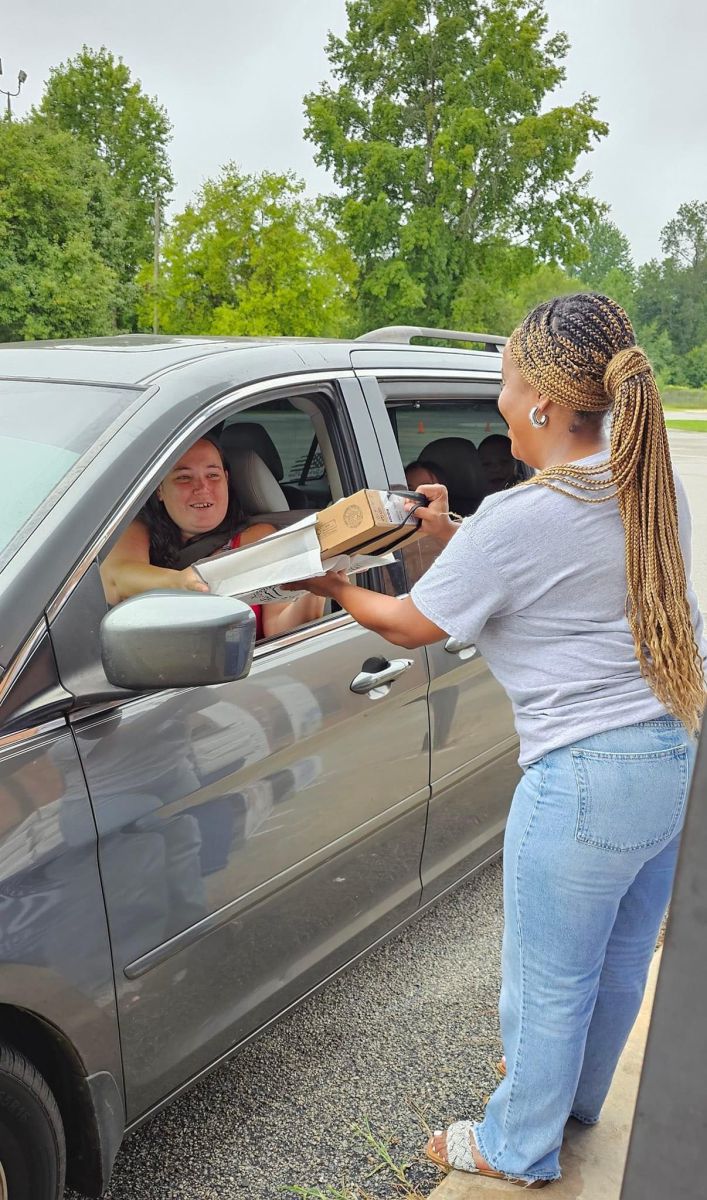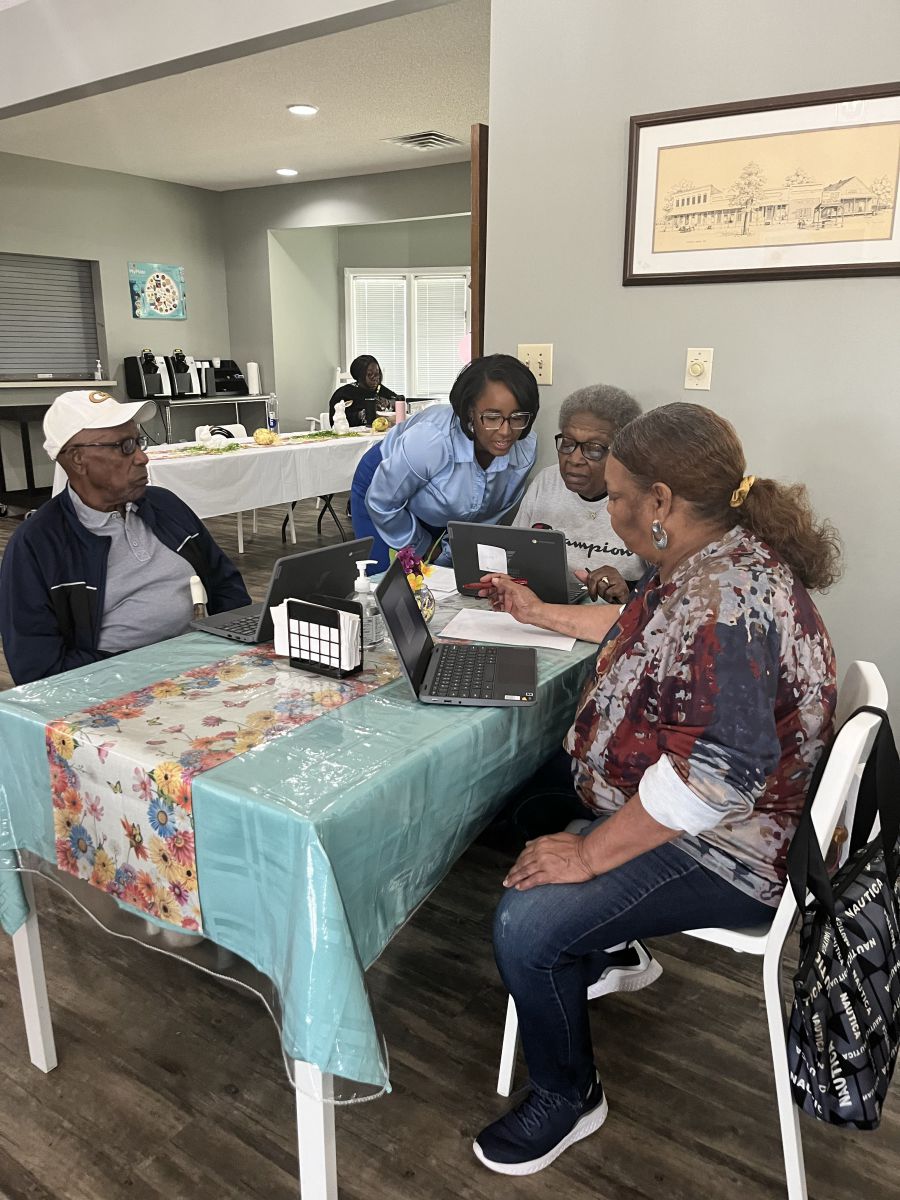News and Press
Connected
Posted on Nov 05, 2025 at 15:14 PM

Resident of Crawford County receives a laptop during a back-to-school event from Courtney Howard, project director for Fort Valley State University’s National Telecommunication and Information Administration (NTIA) grant.
Small rural communities may face challenges gaining access to broadband internet in comparison to their urban counterparts.
According to the Georgia Technical Authority, there are 432,374 unserved areas in the state. Of these areas, nearly 75 percent are in rural Georgia.
To address this challenge, Terrence Wolfork, FVSU’s assistant Extension administrator for communications, conferencing and technology, secured a federal grant that provides funding to help Crawford, Peach and Macon Counties cross the digital divide.
The grant is called Fort Valley State University-Communiversity: Piloting an Ecosystem for Digital Equity. It is funded by the U.S Department of Commerce’s National Telecommunication and Information Administration (NTIA). Wolfork serves as the executive administrator of the grant.
To administer this grant, FVSU Extension partnered with the Public Service Telephone Company, Peach Public Libraries, Crawford County Libraries, Macon County Libraries and the Fort Valley Youth Center of Excellence to provide services.
The $2,997,558 grant, which started on March 1, 2023, provides broadband access and accessibility to communities within 15 miles of FVSU. It is scheduled to end on March 28, 2026.
Funds from the grant are being used to purchase materials such as computers, hardware, software and equipment needed for broadband infrastructure.
“This grant funds a pilot project from the U.S Department of Commerce to help small universities become more involved by providing services to communities 15 miles from the main campus. We have students and citizens who live in the area. This allows us to build the infrastructure they need for broadband access,” Wolfork said.
Courtney Howard, FVSU’s NTIA project director, said the grant has helped to fund a host of projects in a tri-county area.
This includes computer labs at the Fort Valley Youth Center for Excellence, the Crawford County Extension Center and infrastructure for parks in downtown Fort Valley and Roberta to make them free Wi-Fi zones. Likewise, the grant funds are being used to conduct a technology program for seniors who want to learn how to use a computer.
“Anybody who is looking to improve their digital literacy, or access to technology resources and broadband internet are the people we’re looking to help,” Howard said.
Furthermore, Howard discussed the numerous advantages received by communities once there is access to high-speed internet. One example she shared is how senior citizens benefit from
broadband availability.
“In today’s digital world, most of our community members who are 65 years old, or older, have limited access to drive to the doctor’s office or to go shopping. Learning how to use the computer can open the door to such things as telehealth, which uses platforms such as ZOOM to meet their appointments. They can also have access to online shopping or connect with family members,” she said.
Howard added that broadband access can help rural residents become more efficient in the workplace.
“Technology is changing every day and every year. If one does not enhance or invest in their professional development, they could fall behind when it comes to adapting to tech. This is also an opportunity for everyday workers to improve their quality to services and lifestyle.”
As FVSU’s NTIA project director, Howard said she enjoys providing rural residents an avenue to the digital world and one of her favorite projects involved her hometown of Crawford County.
 Senior citizens in Crawford County learn basic computer skills through the NTIA grant.
Senior citizens in Crawford County learn basic computer skills through the NTIA grant.
After a successful proposal to Crawford County commissioners, funds from the grant allowed FVSU to purchase infrastructure needed to convert David Bailey Park in Roberta, Georgia, into a free Wi-Fi Zone.
Sharon Sanders, county manager for the Crawford County Board of Commissioners, said the Wi-Fi service is very beneficial for the residents.
“So many people and families cannot afford Wi-Fi services through their phone or an internet provider. This is a way that kids can come in, log on, do homework and complete the things they need to do,” said the Crawford County official.
Wolfork added that Howard has developed working relationships with several communities in providing them with broadband access. This has led to most, if not all the communities agreeing to continuing internet services once the grant ends.
For more information about this project or interests in participating in future NTIA projects, contact Howard at (478) 825-6955 (Courtney.Howard@fvsu.edu) or Wolfork at (478) 825-6053 (wolforkt@fvsu.edu).
- Categories:
- FVSU Agriculture College
- Tags:
- Extension
Media Contact
- Russell Boone
- Booner@fvsu.edu